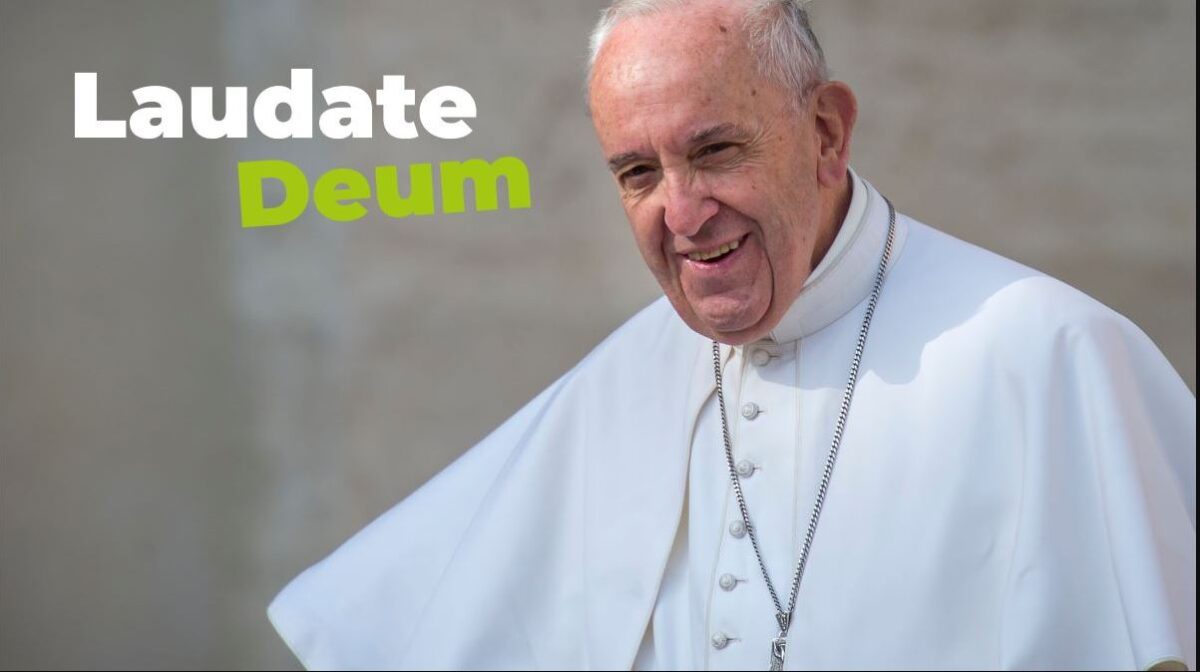Laudate Deum and COP28

During COP28 in Dubai, Francis from our Theology team reflects on the Pope’s urgent call to action on the climate crisis in Laudate Deum.
Answers from the heavens
In the book of Exodus, as the Israelites wander in the wilderness, they are ready to give up. They even start to consider whether it would be better to have died from the plague than to have escaped Egypt. Imagine their joy, then, when they hear God’s promise to send them manna from heaven to sustain them.
We often look ‘to the heavens’ when we have run out of resources. Sometimes we put our faith in worldly figures of authority. We might look to the world leaders debating in the distant ‘heavens’ of global summits, like the ongoing Conference of Parties on Climate Change (COP28) in Dubai.
Looking towards COP28
Pope Francis’ exhortation on the climate crisis, Laudate Deum, echoes and extends the themes of Catholic social teaching and ecology that Laudato Si’ brought together over 8 years ago. Yet it is more urgent and clear about the irreversible damage already done to our common home.
What is Laudate Deum? Find out more with your questions answered.
Pope Francis describes the earth as “a gift” less in the new exhortation than in Laudato Si’. Yet this indicates no shift in theology. It probably seeks to avoid the misunderstanding that a “gift” has no strings attached, no obligations of gratitude and reciprocity attached to it.
At COP28, phrases like “nature-based solutions”, “regenerative agriculture” and “carbon neutrality” will probably circulate. These tools and metrics may be useful in themselves, to preserve soil, measure methane emissions from farming, or absorb CO2. Yet they are often promoted by big businesses to excuse other harmful activities. Turning attention away from the need for an absolute limit on emissions. They reflect the mistaken attitude that business as usual can continue if we make up for it by planting a few trees, or, worse, by tweaking measures.
Laudate Deum does not use these phrases. Pope Francis sees a danger in the desire for magical technical solutions. The crisis we face, he says, is rooted in having so much power without being able to control it:
Not every increase in power represents progress for humanity. We need only think of the “admirable” technologies that were employed to decimate populations, drop atomic bombs and annihilate ethnic groups.
Laudate Deum, 24
The last line of the exhortation expresses this with a chilling statement: “’Praise God’ is the title of this letter. For when human beings claim to take God’s place, they become their own worst enemies.” (LD, 73)
Structural sin
At COP27, CAFOD and The Symposium of Episcopal Conferences of Africa and Madagascar convened a side-event with Cardinal Fridolin Ambongo Besungu of the Democratic Republic of Congo. The Cardinal highlighted the importance of including the reform of the global food system within the formal negotiations about climate change. He echoed a previous statement of African Bishops that climate change is a “tragic and striking example of structural sin”. This was echoed once again by the Pope in the introduction of Laudate Deum.
We may be prone to thinking of sin as immoral behaviour. Yet sin is anything that stifles our conversion to God’s call, as with the crop choked by the thorns in Jesus’ parable of the sower (Matthew 13: 1-8). The phrase “structural sin” reminds us that these ‘thorns’ are often structures and powers in the world. Obsession with technology, finance and power stifles care for our common home, offering excuses not to convert our societies at a deeper level.
This deep change is the focus of Laudate Deum. Thus, it notes the creation of a loss and damage fund for peoples whose livelihoods and sacred inheritance has been irreversibly harmed by climate change (LD, 46). It speaks of the dignified work that can be found in the transition to renewable energy (LD, 10). It speaks of a new multilateralism from below (LD 38), and economic vision that includes real costs and benefits in its books (LD, 30, 31).
Hope in the wilderness
In the Exodus story, the community do receive an answer from the heavens. Yet manna does not release them from the wilderness. Instead, it is through this food from heaven that God teaches the people the lessons of the wilderness. These are distribution according to need, no hoarding, and honouring times of rest for people and for the earth.
I was caught out by Pope Francis’ Laudate Deum. I waited for it to give us the answer ‘from the heavens’. But it threw us back into the wilderness, re-emphasising the need for converted hearts as we embark on a “pilgrimage of reconciliation with the world”. The wonders of technology, like manna, are only useful within an economy of daily sharing, of transparency and of Sabbath rest for people and for the earth.
As Advent begins, and we ponder the meaning of hope, we hear the voice crying in the wilderness, to prepare a way for the Lord. Perhaps ridding ourselves of false expectations and easy answers that require nothing of us is the beginning of true hope.
Explore our Advent prayer and reflection resources to dwell on the theme of hope.